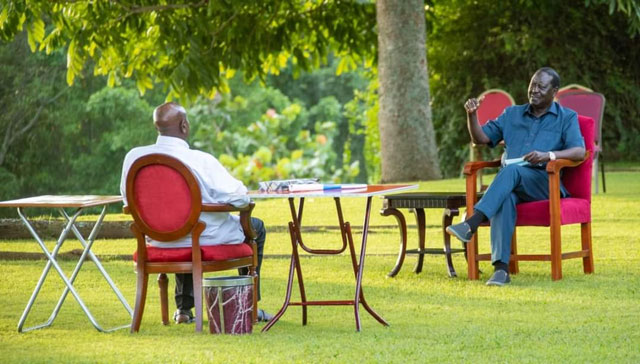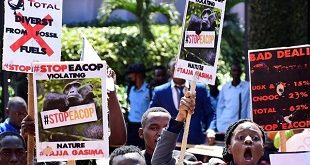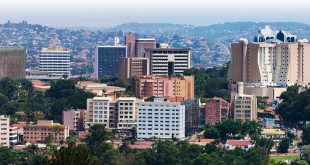
Nairobi, Kenya | THE INDEPENDENT | Following Uganda’s decision to bypass Kenyan oil middlemen and import fuel directly into the country, leading Kenyan politician Raila Odinga has come out with a statement, that has several serious allegations, that is run in full below.
*******
STATEMENT BY THE RT. HON. RAILA ODINGA ON THE KENYA OIL DEAL, NOVEMBER 16, 2023:
Dear Kenyans and friends of Kenya.
You will recall that in April this year, His Excellency William Ruto announced to the nation that his government had signed a Government-to-Government Memorandum of Understanding with Saudi Arabia and the United Arab Emirates for supply of oil to Kenya on favourable terms. Ruto told the country that some four men in his administration had put together something “phenomenal” in the country. His words were:
“They have managed to put together a program that has taken us away from looking for $500 million every month to buy our fuel needs, which was slowly snowballing into a crisis. Today, we can buy fuel in Kenya shillings, something many people never thought would be possible. In fact, in the next one month or so, you will see the exchange rate coming down in a very phenomenal way. In my estimation, in the next couple of months, the exchange rate will come below Ksh120, may be Ksh115, you never know.”
Five facts are undeniable:
1. There was no G-to-G. Kenya did not sign any contract with Saudi Arabia or the UAE. Only the Ministry of Energy and Petroleum signed a deal with state owned petroleum companies in the Middle East. Why Ruto chose to characterize the deal as a G-to-G is the first red flag that points to mischief in this deal.
We now know that the characterization of this deal as G-to-G was meant to shield the three Kenyan companies from paying 30 per cent corporate tax. I will return to this matter.
2. The cost of oil has not come down since the deal was signed.
3. The shilling has continued to fall against the dollar.
4. The scarcity of the dollar has continued.
5. The land locked countries that depend on us for oil are abandoning our pipeline because it has become too expensive.
In other words, the deal has not addressed any of the problems Ruto said it would.
When Ruto initiated this deal, the US-dollar to Kenya-shilling exchange rate was Ksh132. Today, six months later, it is Ksh159 to the dollar.
The cost of fuel shot up significantly after the deal. Why have things moved from bad to worse since the deal?
Well, the deal was a scam for which we now demand full disclosure and full accountability. It is corrupt and rotten to the core. It is state capture by Ruto and company and a conspiracy against the country. Ruto collapsing the country while feeding Kenyans on lullabies.
Other than keeping the cost of oil permanently high in Kenya, the deal is costing the country dearly in terms trade in petroleum with landlocked neighbours.
It is shrouded in deep secrecy. To date, only two documents have been made public; that is the Master Framework Agreement with petroleum trading entities and the Open Tender System modified agreement with marketers.
The Supplier Purchase Agreement between the Middle East Oil firms and their hand-picked distributors in Kenya has never been seen. We challenge Ruto to publish this document.
Nobody knows how Gulf Energy, Galana Oil Kenya Ltd and Oryx Energies Kenya Limited got nominated to handle local logistics. But the hand-picked distributors are selling oil to us at almost twice the price from bulk suppliers.
These companies are also manipulating delivery date ranges so that they can maximize on prices.
We know that in August this year, four months after the deal, the government allowed Oryx Energies to sell oil at prices that had been inflated by 17 percent. In the Ruto deal, Oryx is the supplier of diesel to other oil marketing companies (OMCs) in the country. The excuse was the delay in discharging fuel at the jetty.
This shady business model is being deployed by all the companies that were retained in the Ruto deal. They buy at low prices, delay in discharging, then ask to be allowed to offload at higher prices and the cost is passed to consumers.
In the case of Oryx, it had bought the diesel at an average Platts price of $97.88 (Sh14,182) per barrel in July, but was allowed to sell the same to OMCs at $114.5 (Sh16,585) per barrel.
Some of the companies charging the higher prices deliver more cargo than they were contracted to deliver, forcing Kenyans to buy more of the oil whose prices are inflated, hence the permanent high prices of petroleum products.
The Ministry is changing billing month to allow the oil firms quote higher prices.
For instance, cargo that was bought in July when the price was low is allowed to quote higher August prices and pass the burden to the consumer.
The deal that Ruto hailed as phenomenal has resulted in high landed cost as a result of the structuring of the contract. The faults include the double counting of some cost elements and fixed freighted premium which sometimes are higher by up to $50 per metric tonne. The cost is passed to consumers.
It also lacks flexibility which further exacerbates the pricing model.
Uganda has announced it would no longer purchase petroleum products from Kenya because middlemen have inflated prices by up to 59 per cent, imposing too high a cost on consumers. The exact same scenario is prevailing here. The middle men president Museveni is talking about are Kenya government officials.
The deal has interrupted supply. Gulf Energy, which manages up to 70 per cent of government importation has been experiencing serious challenges securing Letter of Credit. This is because the single bank that was picked to provide the LC is struggling with big bad loans. Consequently, there is delay for clearance of importers to offload oil.
Ships are queuing at sea for up to 18 days awaiting confirmation of LC in order to discharge while the Kenya Pipeline Company goes without operations for days because there is nothing to process. Then the companies incur demurrage, which is transferred to the consumer. Under the Open Tender System, demurrage costs are $45,000 per day for the biggest tanker (LR2) docking at the Port of Mombasa and $31,000 per day for the second-biggest vessel (LR1).
Under the Ruto deal, demurrage has risen up to $70,000 per day. This cost is passed on to consumers at the pump.
You will have noticed that Tanzania recently reduced the cost of petroleum products from 1 November while Kenya’s remain the same or just marginally changed.
Tanzania said it was reducing prices because of decrease in world oil prices by an average 5.68 per cent while premiums for importation of petroleum products had decreased by an average 13 per cent for Super Petrol also known as Premium Motor Gasoline or Premium Motor Spirit (PMS) and 25 percent for Automotive Gas Oil or diesel. You will not hear that story here because of the corrupt dealings written into the Ruto deal.
As ships accumulate extra charges in the seas, the money sits in an Escrow account in a local bank where it earns interest. It remains unclear who the beneficiary of the accrued interest is.
This deal has led to high cost of oil products sourced through the Northern Corridor Transit Route (Kenya route).
The freight and premium rates for May 2023 cargoes were higher in the Northern Corridor by 61 per cent compared to the Central Corridor. That rise in freight and premium is reflected at the pump.
That is what has pushed Uganda and other forward markets like South Sudan, East DRC, Rwanda and Burundi to consider importing goods through the Central Corridor or Tanzania route. Uganda is shifting to the central corridor.
The volume it ferries via Kenya Pipeline has dropped to 52 per cent, from 70 per cent. So, other than making petroleum products ever more costly, the deal is going to kill the Kenya Pipeline Company as soon as this year.
The transit volumes account for 51 per cent of Kenya Pipeline Company’s revenue which stands at an average Kshs. 2.6 billion per month.
When the company loses in the volume transported, it results in higher tariffs which is transferred to the local consumer in terms of higher cost of petroleum products. A 10 per cent reduction in the transit volumes would result in a 5 per cent increase in tariff, which is reflected at the pump in terms of cost of fuel.
The change of route by land locked trading partners will force a number of Kenyan Oil Marketing companies and logistics firms to close shop.
Of course this leads to job losses, loss of foreign exchange, loss of revenue for the country as a result of KPC losing transit share.
Ideally, Kenya should have provided a pipeline and storage capacity allocation for Uganda market. Kenya should also have allowed the direct participation of Uganda oil marketers in sourcing petroleum products through the northern corridor route.
But because corruption was written into the deal, the Ruto administration could not allow neighbours in, fearing exposure.
Consequently, the KPC is set to lose substantial business to Tanzania. Uganda’s shift to the central corridor will most certainly influence Rwanda, Eastern Democratic Republic of Congo, and South Sudan.
As KPC loses business, it will charge more for its products to stay afloat, hence the ever rising cost of petroleum products.
The deal only ended up creating irregular supplies and higher prices. Open tender system allowed for competitive sourcing of fuel. Monopolistic tendencies for purposes of maximizing profit goes against demand for efficiency and need to lower prices.
It is going to drive a number of oil marketing firms out of business, leading to job losses and loss of revenue for the government.
The deal that Ruto signed with the oil companies has excessively high Freights and Premiums compared to those witnessed in Open Tender Systems. They are as high as an additional $50 dollars per metric tonne.
In the end, Kenya is losing billions of shillings in taxes because the three companies picked to spearhead this deal do not pay the 30 per cent corporate tax. Shielding the companies the three companies from this tax is the reason Ruto told Kenyans that it was G-to-G. Your guess is as good as mine on who is pocketing the unpaid corporate tax. But the burden of the unpaid corporate tax is passed to Kenyans at the pump.
OUR STAND:
1. Ruto must immediately cancel the contract and revert to the Open Tender System which ensured guaranteed supply of petroleum products. It assigned responsibility to various players as opposed to the so called G to G that is making Kenyans depend on one inefficient and corrupt player.
The open tender system was efficient, accountable and competitive and offered prices commensurate with international pricing model.
2. The Ethics and Anti-Corruption Commission needs to move in not to sanitize but to get to the bottom of how and why we got into this deal and who is benefiting from it.
3. The men and women who came up with this self-serving deal must be surcharged and sacked.
4. The government must restore taxes to 8 per cent from the 16 percent that came with the Finance Act.
5. The government must make public the so-called MoU between Kenya and Saudi Arabia and the United Arab Emirates.
6. The Ministry of Energy and Petroleum must make public the deal it signed with the oil companies.
7. The Ministry of Energy and Petroleum must make public the Supplier Purchase Agreement it signed with the oil companies.
8. EACC and the Directorate of Criminal Investigations must investigate the tax compliance status and pricing model of the three oil companies.
9. The Kenya Revenue Authority must come clean on the tax compliance status of the three oil companies and explain why they are being enabled to evade billions in taxes while ordinary Kenyans are being harassed for taxes.
10. We need a comprehensive brief on what the move by Uganda to pursue much of its petroleum needs through the Tanzanian Central corridor means to our country especially to the future of the Kenya Pipeline Company.
*****
SOURCE: @AzimioTv on X
****
RELATED STORIES
 The Independent Uganda: You get the Truth we Pay the Price
The Independent Uganda: You get the Truth we Pay the Price



It will be difficult to deal with oil middlemen.